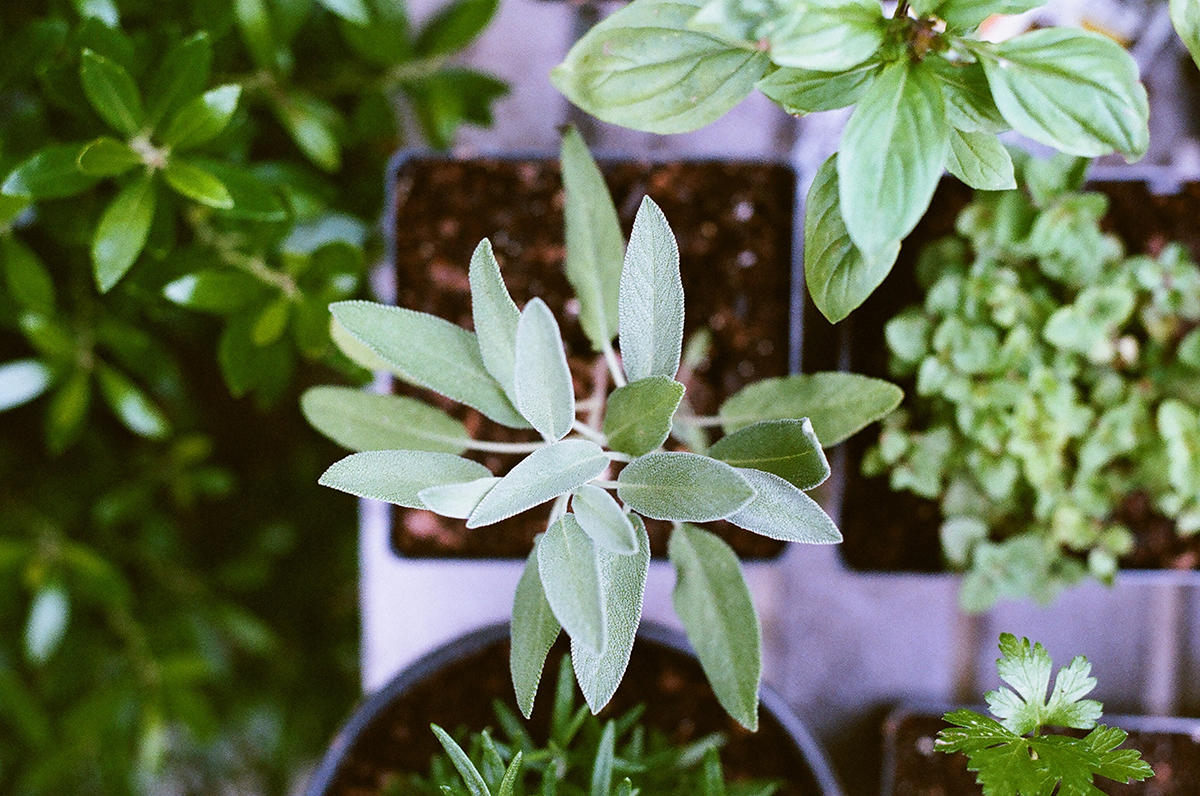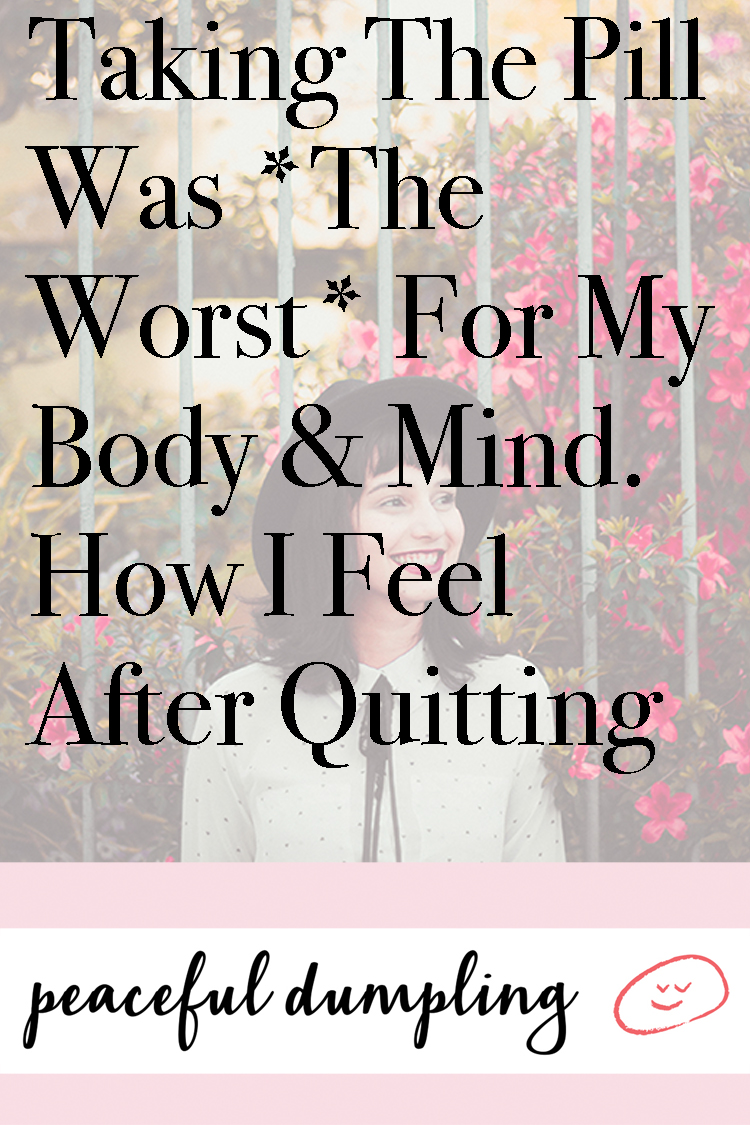To question something that is a societal norm is a bizarre and thrilling sensation. For me, the “norm” in question was hormonal birth control. Taking a pill every day for 8 years was something I did without question. It’s something I wasn’t even consciously aware was optional. But snowballing into deeper and deeper depression made me do my research. Could it really be that one little daily pill was making my life hell without me even realizing it? The answer, as it turns out, was yes.

I, like so many other women, started taking the birth control pill as a teenager. I was 18, heading off to college and thought I’d take the pill in case I wanted to get frisky *face palm.* I didn’t have periods to complain about. They had settled down from several years prior, thankfully. But to me, taking the pill was a rite of passage, of sorts. It went hand in hand with paying my taxes and taking out the trash. It was part of being an adult woman. It was the responsible thing to do.
That first appointment with the doctor was brief. He took my height and weight and asked me a few questions about my family history and then sent me off with my prescription. I was a baby-making machine and I needed reigning in. I had to put proper control measures in place so I wasn’t popping out kids left, right and center. I was determined and ambitious and this was the best decision I could have made for myself and my future. Wrong.
Over a period of 8 years, I worked my way through 3 different brands of pill, each with their own unbearable side effects and got myself into two serious relationships where contraception was never even discussed; the pill was assumed. But finally, things got so bad, and I had reached a crisis point and had to do something. I had a healthy diet, I did plenty of exercise, and I was going to therapy. The only thing left to try was not taking this damn pill every day. They say we only make a change when the risk of it not working out is less stressful than the pain of doing nothing. That was me.
Prior to popping that last pill, I did my research. Books, blogs and Youtube were lifesavers and persuaded me with each passing day. It was a revelation to find that I wasn’t actually a baby-making machine. I was only fertile for a small window of each month, unlike sperm-producing men who are actually fertile 24/7. That seemed like a strange notion; men are fertile all the time, yet women have to take a pill? Why did we have to suffer a whole host of side effects when we only needed protection for a few days each month? Suddenly being pill-free didn’t seem too scary. Being pill-free wasn’t, actually, equivalent to being pregnant (as it had been in my head for so long).
I felt excited about the possibility that my depression might lift. Plus, mental health problems aside, there’s something incredibly unsettling about trying to be on a path to your best, most authentic self when every day you’re taking a medication that is essentially giving your body the message: you are not good enough functioning in your natural state. You need manipulating.

I went through one revelation after another while preparing myself for the final goodbye and it was horrifying having to force down those last few pills towards the end of the pack. I’d had my eyes opened to just how much they were destroying my body and it felt like I was poisoning myself with every day that I swallowed one down.
The fascinating thing about the birth control pill is that it’s the only type of pill that healthy people take to make themselves sick. Ponder that one for a moment. The female body is born to experience a cyclical way of life. Much like the phases of the moon, we have four phases that comprise our menstrual cycle. However, the problem is that also like the phases of the moon, we have different strengths and weaknesses during each. This means that we’re not the same day to day and in a man’s world, that just doesn’t cut the mustard.
Lifestyle factors aside, a man can safely be assumed to be the same on any given day of the month. For women, it just isn’t that simple. During our menstrual phase, it’s a call to take time for ourselves. Quiet time. During our follicular phase, we’re motivated and beaming with energy to be productive. During our ovulatory phase, we’re confident, most attractive and best at connecting with others. Finally, during our luteal phase, we’re more emotional and forced to deal with anything that’s simmering beneath the surface. It’s a time of reflection.
Society is, unfortunately, not built to accommodate women’s needs. We’ve fought for equality all these years, all the while believing that in order to be successful, we need to make ourselves more like men. How is that fair or just? Only when women are encouraged to be period positive and in love with themselves in their natural states will we truly be equal.
Thankfully, though, more and more of us are waking up to the fact that taking hormonal birth control is optional. And there are alternative forms that have no negative health implications. I now practice the Fertility Awareness Method (FAM) and couldn’t be happier. It allows me to be more in touch with my body and the changes it goes through each month than I’ve ever been able to experience before.

It’s been 6 months off the pill now and – hand on heart – I feel more and more alive and awake and myself than ever before in my life. I’ve felt the joy of small things and connection with others and the general feeling that everything is going to be OK (something foreign to someone who felt indifferent for so long). The only negative side effect I’ve had is some cystic acne, but my research has revealed that skin can take up to a year to stabilize (while your hormones do), so I’m treating it with care and being patient while it does its thing.
If you’ve been thinking about it for a while and are tired of taking the pill, here are my top pointers:
Do your research. Learn everything you can and help yourself along by feeling prepared for venturing into the unknown. The Pill by Jane Bennett & Alexandra Pope is a great place to start.
Be responsible. If you’re coming off the pill and in a sexual relationship, make sure you use an alternative method of protection.
Eat well. Nutrition is everything. The pill reduces your ability to absorb many essential vitamins and minerals, so it’s really important to fill your diet with ample fresh fruits and vegetables to help normalize after such a dramatic change.
Dramatically reduce your sugar consumption. It is our liver’s job to break down excess hormones in the body. It can’t be focussed on this if it’s too busy converting glucose to glycogen because you’re eating too much sugar. Letting those hormones accumulate in the body is what will give you negative side effects.
Respect the phases of your cycle. The best thing you can do when you ditch the pill is realize that you need to start cooperating with your body and give it what it needs at different times of the month. Accept that self-love is taking time for self-care while you’re menstruating, because if you do so, you’ll be rewarded a few days later with a burst of energy.

Have you been suffering as a result of taking hormonal birth control? Or maybe you’ve ditched the pill already? Let us know about your experience!
Also by Kat: I Lived A Month With No Social Media–And Found My Life Purpose In The Process
Related: What I Wish I Knew Before Taking Birth Control
Let’s Stop Putting Burden Of Safe Sex On Women: Why Millennials Want Male Birth Control
Get more like this–sign up for our newsletter for exclusive inspirational content!
__
